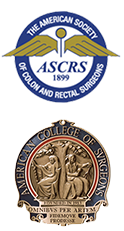Hereditary Colon Cancer
Colorectal cancer is one of the most common cancers affecting mankind – 6% of the U.S. population will develop colorectal cancer at some point in their lives. The mechanisms which lead to the transformation of a normal cell to a cancerous cell (the “adenoma-to-carcinoma sequence”) is caused by mutations or disturbances to a cell’s genetic code. A series of chance mutations within a given cell can transform it from a normal, functioning cell to a cell that has lost its function and regulated interaction with its neighboring cells, thereby, becoming a cancer.
The majority over 70% of cancers occur in a “sporadic” fashion due to a series of these chance mutations and are, therefore, not an inherited cancer. Sporadic colon cancer usually occurs later in life (>60 years old) among people without other affected family members.
Familial Colorectal Cancer:
However, up to a third of colon cancer cases exhibit a moderate form of inheritance. There are certain families in which colorectal cancer occurs much more frequently than would be expected by pure chance. It appears that these patients have been born with one of the abnormal (“mutated”) genes already present in each of their cells. This makes the likelihood of collecting the additional random mutations that can lead to cancer much less of a rarity. Members of such a family carry a higher risk of developing colon cancer, often at an early age.
There should be concern if a family has more than one relative with colorectal cancer or if the relative developed that cancer before the age of 50. It has been shown that having a first-degree relative (parent, brother, sister or child) with colorectal cancer doubles the risk of developing cancer. For this reason, a detailed family history will be obtained during the visit – please have information regarding any cancers and the age of diagnosis for all family members.
Specific Inherited Cancer Syndromes:
A second group of inherited cancer syndromes also exists in 3-5% of colon cancers. These cancers often occur at a much younger age and a clear high risk family tree is usually present, with generation after generation of the family suffering from cancer. These include:
- HNPCC (Hereditary Non-Polyposis Colon Cancer, Lynch Syndrome)
- FAP (Familial Adenomatous Polyposis)
- aFAP (Attenuated Familial Adenomatous Polyposis)
- APCI 1307K
- Peutz-Jehger’s Syndrome
- MAP (MYH associated Polyposis)
- Juvenile Polyposis
- Hereditary Polyposis
Review and Recommendations:
Although the majority of colorectal cancers occur sporadically, with no clear familial risk factors, up to one third of cancers exhibit some form of inheritance. In addition, 3-5% of colorectal cancers result from inherited cancer syndromes. If a member of your family has been diagnosed with colon cancer, especially at a young age, it is important for you to review your increased risk of developing colon cancer with your physician. The proper screening strategy for you and your family can be developed with this information.
Screening:
The average risk adult should undergo initial screening colonoscopy at age 50. Additional screening guidelines have been developed based on the familial risk factors. The general rule being: persons of higher-risk families should have an initial screening colonoscopy performed at age 40 or 10 years earlier than the youngest documented colorectal cancer in the family – whichever comes first. Surveillance colonoscopy should then be performed at least every five years. In some cases, further action may be indicated including genetic counseling, genetic testing, referral to other specialist and routine follow-up examinations.
More aggressive screening is indicated for persons in families with multiple first-degree relatives with colon cancer or a first-degree relative who has been diagnosed under the age of 50 years. A small fraction of these may be due to a specific colorectal cancer syndrome. The cancers associated with these syndromes can occur at very young ages – this requires a high index of suspicion and proper screening of younger adults within the family. Simple blood tests and oral swab tests are available to perform genetic testing in order to diagnose these syndromes. The diagnosis of a specific syndrome calls for more aggressive screening protocols and surgical intervention in order to either prevent cancer development or to diagnose/treat it at an early stage.





